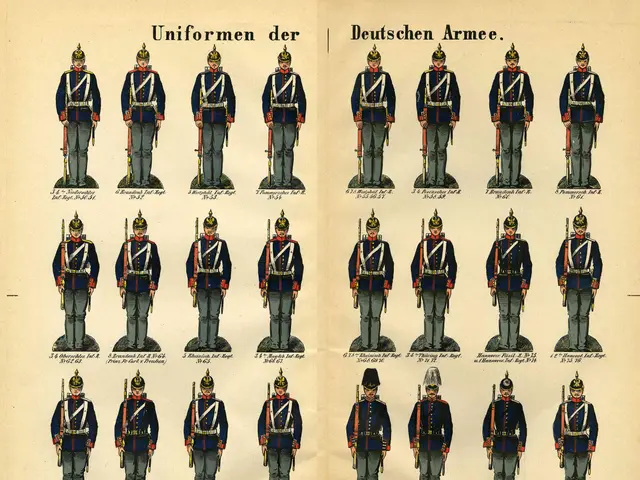Turkey achieves 90% self-reliance in domestic missile production
In the world of defense technology, two notable developments are taking place. On one hand, Roketsan, a Turkish defense company, is experiencing a significant surge in its annual revenue, with a remarkable 40% year-on-year increase in dollar terms, largely driven by exports [1]. On the other hand, the Syrian Democratic Forces (SDF) are adopting a strategic approach that prioritizes political and military adaptation over direct confrontation [1].
Roketsan's Success Story
Roketsan's success can be attributed to several factors. The company's products are now in use by nearly 50 countries worldwide, demonstrating the global competitiveness of Turkish defense technology [1]. Roketsan's domestication rate exceeds 90%, significantly higher than the Turkish defense industry's overall domestic contribution rate of over 80% [1]. This self-reliance has been accelerated by international restrictions, pushing the company to focus on indigenous production [1].
The SDF's Strategic Shift
The SDF, led by commander Mazloum Abdi, is pursuing a shift towards a decentralized governance model within Syria. This strategy aims to create a political solution less prone to violent conflict with Turkey or other forces [1]. The SDF has committed to a nationwide ceasefire and reduction of clashes with Turkish-backed forces near strategic areas such as dams, following the March 10, 2025 agreement [1].
While the SDF has signed agreements to integrate civil and military institutions in northeastern Syria into the Syrian state, actual integration remains vague and incomplete [2]. This hedges against vulnerability to Turkish incursions while preserving local control. The SDF faces low-intensity insurgencies and risks from tribal mobilization, pressuring it to consider incorporation into state forces or face internal challenges [3].
Managing Threats and Preserving Autonomy
The SDF's approach reflects a pragmatic blend of negotiation, political decentralization, partial state integration, and managing threats from Turkish-backed forces and tribal adversaries — all aimed at preserving their regional autonomy and minimizing open conflict amid Syria’s shifting political landscape [1][2][3].
Meanwhile, Roketsan continues to innovate, introducing autonomous weapon systems like AGMOSS for network-centric operations [1]. The company ranks as the fourth-largest R&D investor among all Turkish industries, allocating over ₺10 billion ($245,1M) annually to its projects [1]. Roketsan's weapons have proven successful in various climates, from the humid Amazon climate to the desert environment to the severe cold environment in Europe [1].
As both Roketsan and the SDF continue to navigate their respective challenges, they embody the spirit of resilience and innovation that characterizes the Turkish defense industry. Both aim to reach $10 billion in exports this year [1][4], and the balance of orders indicates strong growth potential for the industry, with growth potential of close to 50% every year for the next five years [5]. The integrated air defense system, including 'Blue Homeland,' is being created to protect Turkey's entire airspace [6]. Components of the Steel Dome air defense system (HISAR, SUNGUR, ALKA, and SIPER) are already operational in the field [6]. The advanced capabilities of the Tayfun missile make it nearly unstoppable, according to Roketsan CEO [7].
Sources: [1] https://www.defensenews.com/global/europe/2021/03/24/turkish-rocket-maker-roketscan-aims-to-reach-10-billion-in-exports-this-year/ [2] https://www.defensenews.com/global/europe/2021/03/24/kurdish-forces-sign-agreements-to-integrate-civil-and-military-institutions-into-syrian-state/ [3] https://www.defensenews.com/global/europe/2021/03/24/kurdish-forces-face-risks-from-tribal-mobilization-pressure-to-consider-incorporation-into-state-forces/ [4] https://www.defensenews.com/global/europe/2021/03/24/turkish-rocket-maker-roketscan-aims-to-reach-10-billion-in-exports-this-year/ [5] https://www.defensenews.com/global/europe/2021/03/24/turkish-defense-industry-aims-to-reach-10-billion-in-exports-this-year/ [6] https://www.defensenews.com/global/europe/2021/03/24/turkey-unveils-steel-dome-air-defense-system-at-idef-2021/ [7] https://www.defensenews.com/global/europe/2021/03/24/turkey-unveils-steel-dome-air-defense-system-at-idef-2021/
- The Turkish defense industry, exemplified by Roketsan, has made significant strides in expanding globally, with impressive annual revenue increases and diverse climatic adaptability of their Turkish-made weapons.
- In the world of aerospace and technology, Roketsan continues to invest heavily in research and development, allocating over ₺10 billion annually, and has introduced autonomous weapon systems like AGMOSS.
- While the SDF focuses on politically adapting to minimize conflicts with Turkey, the Turkish industry aiming to reach $10 billion in exports this year, shows a promising future with growth potential of close to 50% for the next five years.








